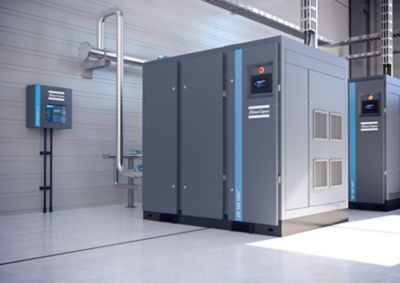The Ultimate Guide to Variable Speed Drive (VSD) Compressors
Variable Speed Drive (VSD) compressors are a game-changer in the world of compressed air. These compressors automatically adjust their operating speeds to match the real-time demand for compressed air. It's an important feature, especially when it comes to energy savings. Surprisingly, the electricity consumed by a compressor can account for the largest portion of its total cost of ownership, not the initial purchase price. On average, VSD technology can reduce energy costs by 35% to 50%, which translates into significant savings.
Now, let's delve into the key differences between fixed speed and VSD compressors. Fixed-speed compressors are simpler machines with a lower upfront cost. You turn them on, and they run at full speed until they need to be shut off. It's a straightforward concept. On the other hand, VSD compressors are more advanced. They don't just run and stop; they precisely match their output to the demand, making them highly sophisticated. Consequently, the initial investment for VSD compressors can be higher due to their superior capabilities.
But when should you consider investing in a Variable Speed Drive (VSD) compressor? While VSD technology seems ideal for any business, it may not always be the best solution. VSD compressors are most suitable for businesses with fluctuating demand, such as those with varying processes or multiple shifts. Situations that warrant a VSD compressor include when compressed air demand varies significantly between jobs, fluctuates by shift, day of the week (e.g., weekends), or seasonally, or when production requires precise pressure control. If your operation is consistent without significant demand fluctuations, or if the variations are minimal, a fixed speed compressor might be the better option.
Alternatively, you can consider a hybrid solution by combining a fixed speed compressor with a VSD compressor. The fixed speed compressor would handle the base load, while the VSD compressor(s) would trim the demand as needed. This setup provides redundancy, ensuring uninterrupted production. If one compressor shuts down, the other takes over the full demand, keeping operations running smoothly.
Now, let's explore the benefits of investing in a VSD compressor:
- While VSD compressors have a higher initial investment cost, they quickly pay back that investment through energy savings. The greater the demand variation, the higher the potential savings.
- VSD compressors operate within a much tighter pressure range compared to fixed speed compressors.
- They can maintain the required minimum working pressure of your air system while operating at lower delivery pressures. Additionally, they provide consistent discharge pressure for all compressed air applications throughout your facility.
- A VSD compressor allows you to set the net pressure lower than the unloaded pressure of a fixed speed compressor. Every 1 bar reduction in pressure results in a 7% energy savings.
- VSD compressors can start and stop under full system pressure, eliminating the need for unloading. This saves both time and energy. Furthermore, there are no idling periods or blow-off losses that occur during normal operations.
VSD compressors offer numerous benefits, including energy savings, precise pressure control, consistent performance, and efficient operation. They are particularly advantageous for businesses with fluctuating demand patterns. However, it's essential to evaluate your specific needs and consider a combination of fixed speed and VSD compressors or a purely fixed speed compressor if the demand variations are minimal.
If you have any questions, reach out to an expert today.

